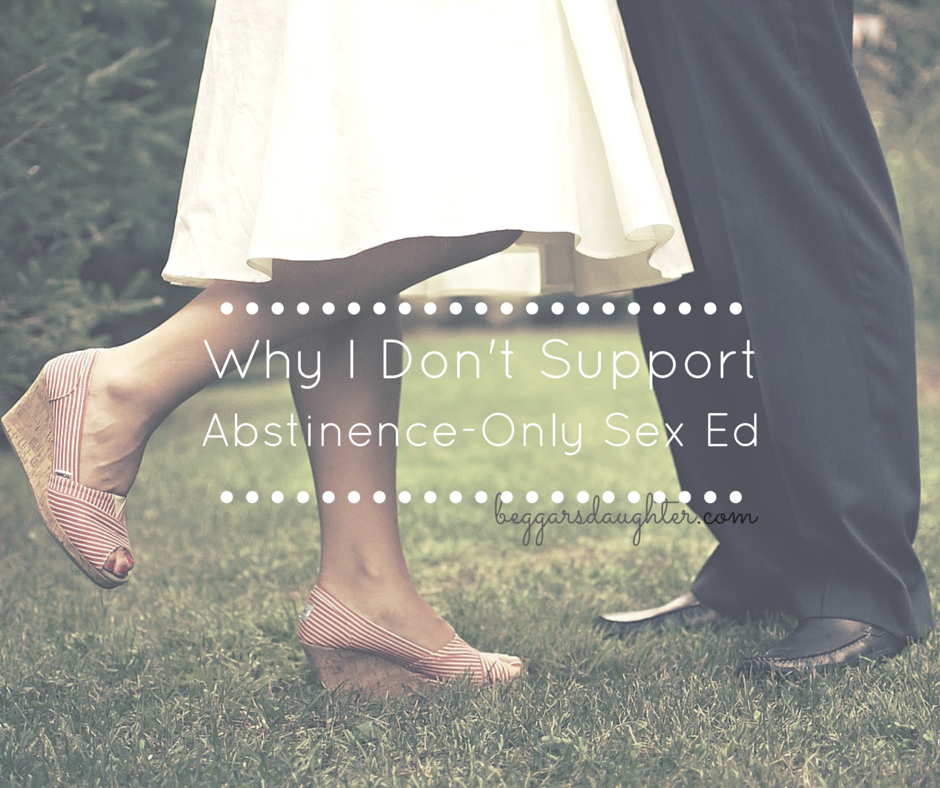Let me preface this by saying I am nearly 30 and still a virgin, so this is not an attempt to justify or pass blame off for adolescent (non-existent) sexual escapades. This is an attempt to change the way we talk about sex and abstinence, because while I may be nearly 30 and still a virgin, my abstinence-only sex education classes have little to do with that.
I remember my first sex ed class. One hundred of my seventh grade classmates and I piled into the choir room and sat facing our guest speaker. He was a bespectacled nurse who was either socially awkward or intimidated by a room full of prepubescent Jr. Highers.
His presentation, as I remember it, was filled with very little “education” as far as how sex worked and a lot more stories of 101 ways sex can go wrong. There was the list of STDs, the unwanted pregnancies, and the girls who bled to death after losing their virginity.
The overall gist of the presentation was “don’t have sex.” Sex was dangerous, even deadly.
And judging by the fact that 4 of my classmates got pregnant in the next five years, and the fact that maybe ten of us graduated virgins, I would say his presentation was also entirely ineffective.
Unfortunately, that’s the standard commentary on abstinence-only sex education: it doesn’t work.
This past April, a professor attended her son’s abstinence-only sex ed class and tweeted some of the content (*crude language warning*). One that seems to sum up any abstinence-only education class I have witnessed is this:
“Condoms. They fail. You get pregnant. Your friends leave you. You drop out of school. Your kids end up in the army.” – Alice Dreger
And it’s no wonder they are completely ineffective.
But I want to encourage you to think a little deeper for a moment. Take off your conservative Christian “thou shalt not have sex before marriage” blinders and give me a few minutes to explain to you why I don’t support these types of classes. Then I’ll tell you what I do support.
Abstinence-Only Sex Ed Classes
1. Treat sex like it’s dangerous
2. Label children as “consequences”
3. Do not acknowledge that there are non-pregnancy-causing ways to have sex
4. Promote sexual shame
5. Assume everyone in the room is capable of a logical hormone-quashing risk-benefit analysis.
Bottom line: there is no real education in abstinence-only sex education classes. People are not taught how pregnancy occurs. They are not taught about sex. They are taught about not having sex. So, really, it’s an abstinence-education class. Frankly, it’s propoganda.
And I get it. I get that you want to protect people from STDs. I get that you want to protect people from unwanted pregnancies or from being publicly shamed. I understand the motive behind it, but I can also tell you, it’s not working.
I’ll be honest, there comes a point when you sit back and think, “Am I seriously going to die a virgin? Let’s see 18% chance a condom will break? Yeah, I think I can live with that.”
I spent two years in a crisis pregnancy clinic sitting across from women, many of them who were raised in abstinence-only religious households. Obviously, they had decided to have sex (because that’s how pregnancy happens).
The heartbreaking thing for me, as a woman, was seeing how completely unknowledgable they were about their own bodies, birth control, or safe sex. They did not even truly understand how to get pregnant. Sure, when a man and woman love each other, sperm meets egg, etc, but they didn’t understand it. In the counseling rooms we had diagrams of the female reproductive system. I would say 50% of the women I worked with couldn’t identify parts of their own body. Why?
Because we’re so afraid of sex that we aren’t even willing to talk about how God made our bodies to partake in it. We think that if we say “never” enough, or we throw enough statistics out there that people will be so scared of sex they won’t do it.
Then, what we have is women so terrified of sex and so convinced that sex is wrong, scary, dirty, and dangerous, that they can’t enjoy it, even in marriage.
(For those women, I encourage you to pick up “The Good Girl’s Guide to Great Sex” by Sheila Wray Gregoire.)
Let’s be honest- nobody wants to get an STD or really wants to get pregnant just so they can get an abortion. But not everybody who has sex will get an STD or will get pregnant.
So, while I understand that motive behind an abstinence-only approach, I disagree with the common method, and find it relatively ineffective all together. The fact is people are going to choose to have sex, no matter how many statistics you throw at them or how many horror stories you tell. We were created as sexual beings and denying that (or ignoring it) is, frankly, foolish.
Here’s the approach I propose:
The Abstinence is a Choice Approach to Sex Ed
1. Present all of the ‘choices’ for sex (as uncomfortable as this might seem) including abstinence. There are non-pregnancy-inducing alternatives to sex. Not saying I personally condone them, but they do exist.
2. Discuss the real risks with all of those alternatives. Why yes, you can get chlamydia in your throat.
3. Discuss birth control methods and ways of preventing STDs- and discuss how certain birth control methods don’t prevent STDs and how other STDs (read: HIV) don’t show up in blood tests for weeks after infection.
4. Explain the process of getting pregnant- how does a woman’s cycle work? What are signs of fertility? How does orgasm work? How does a sperm find the egg? Explain it all.
5. Talk about healthy sex and unhealthy sex because that’s different from safe and unsafe sex. Safe and unsafe refers to physical health/pregnancy/STDs while healthy and unhealthy is more relational.
6. Talk about the dangers of sexting and meeting strangers for sex.
7. While you’re at it, tackle the topic of porn use, abuse, addiction, etc and its effects.
Let sex education actually be education. Yes, the safest sex is no sex. And some people will wait until marriage for various reasons, but not all of them will, so at least try to protect them. Don’t act like they deserve the “consequences.”
To be clear, I wholeheartedly support abstinence. In fact, I encourage it. I also know that there are many who do not and will not practice it for various reasons, and while I might hope they would, the best I (or any bespectacled socially awkward nurse) can do is equip them to protect themselves.





